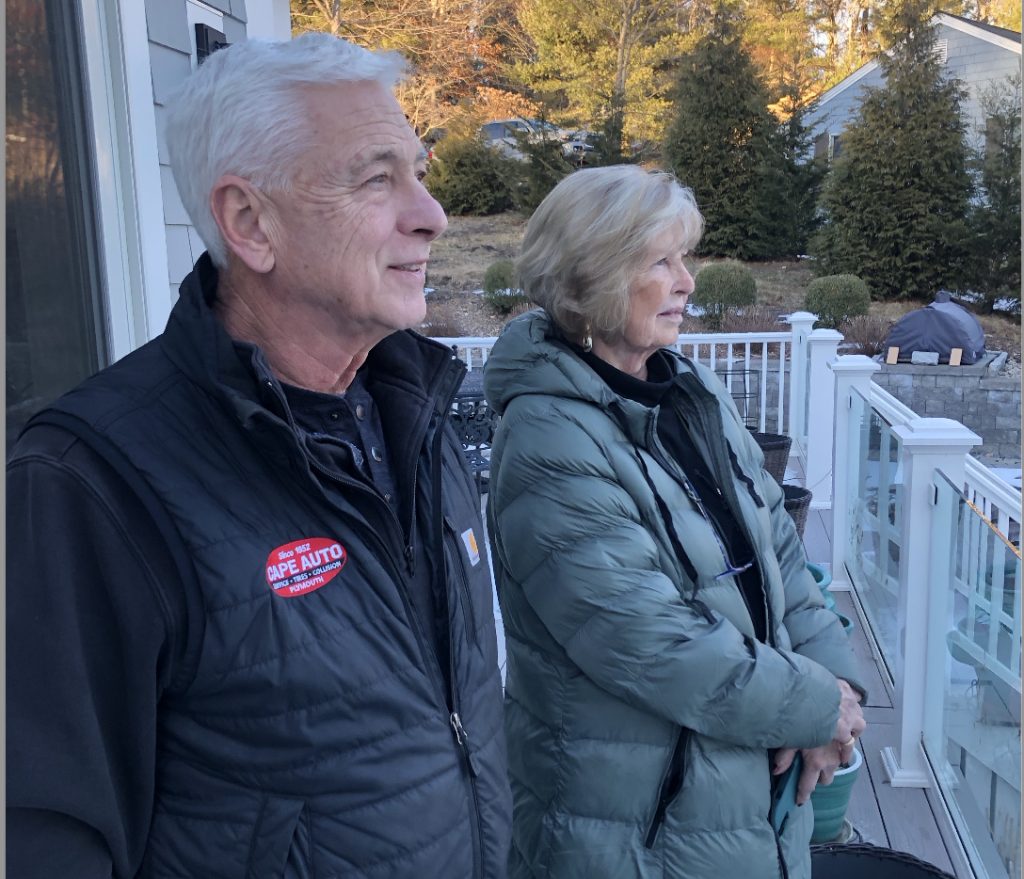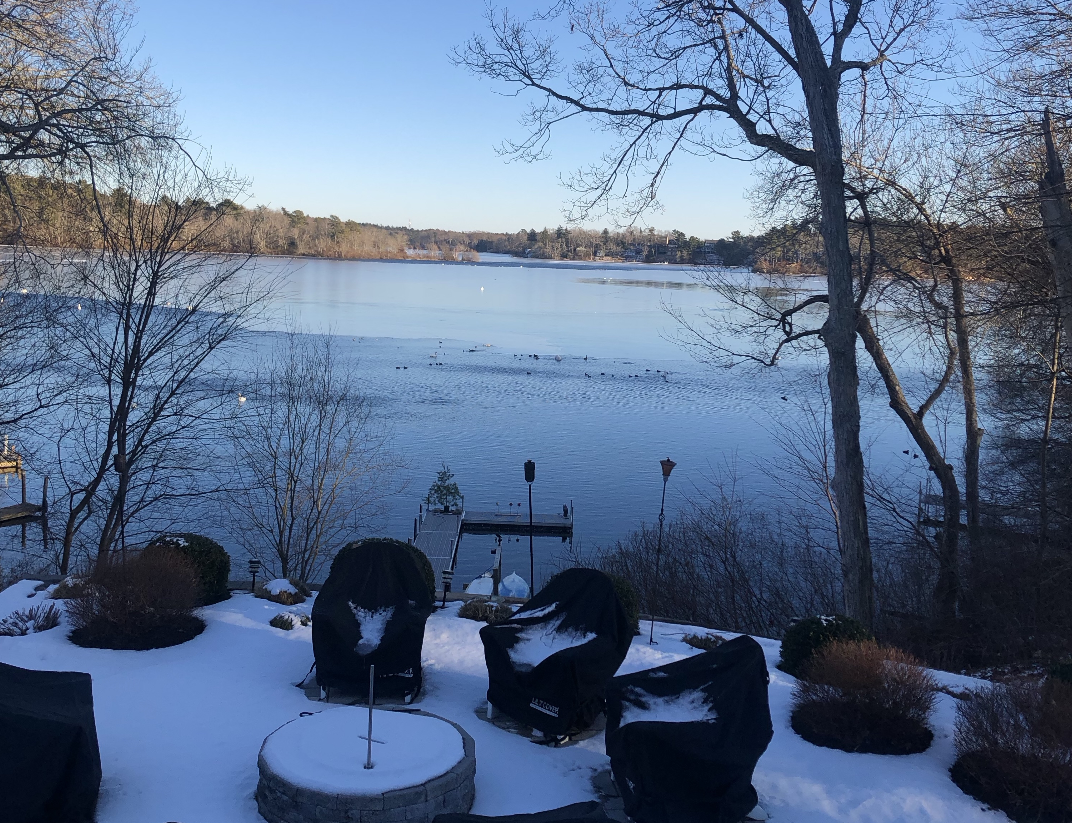On a recent afternoon, Dave Gallerani looked out from his deck at ducks and swans swimming on Billington Sea. But on closer inspection, the scene was far from idyllic. He pointed to two dead swans on a frozen section of the pond. They were among the many dead and dying birds Gallerani has seen since the town and state gathered about 55 of them on Jan. 19.
Gallerani and his neighbor, Suzanne McCallum, worry that the dead birds carry the H5N1 virus, also known as avian influenza or bird flu. They could be picked up by scavengers – such as bald eagles, gulls, crows, foxes, and coyotes – or by cats and dogs.
“We’ve been witnessing the deaths of so many birds,” McCallum said. “We feel we’ve not gotten enough attention.”
But Casey Kennedy, the town’s communications coordinator, said officials are trying to control what is believed to be a bird flu outbreak. So far, they have been limited by the pond’s thin ice, which has made it unsafe to collect all the dead birds, she said.
That sentiment was echoed by Michelle Bratti, the town’s health and human services commissioner.
“We recognize the sensitive and stressful nature of this situation and are maintaining consistent communications with state officials to expedite collection efforts as soon as safely possible,” Bratti said in a statement.
Kennedy said MassWildlife staff last Friday assessed the number of dead birds on the pond, as well as the safety conditions.
On Tuesday, MassWildlife collected another 12 dead birds around Billington Sea, said Karen Keane, the town’s director of public health. A spokesperson for MassWildlife said it is planning to return Wednesday to retrieve more birds if conditions are safe.
The state agency reported that there are still “quite a few” birds out on the ice, Keane said. She added that Mass Wildlife is awaiting “a couple” of days of weather with temperatures above 40 degrees so that crews can go out in boats and chip away at the ice to remove the birds.
Meanwhile, the town’s three animal control officers have been collecting dead birds along the shoreline whenever conditions permit, Keane said.

Town officials continue to advise residents to keep domestic animals away from any dead birds, and to avoid touching the carcasses.
Keane said cats are especially susceptible to avian flu. She urged people to bring outdoor cats indoors for now. Dogs should be leashed, she said, so that they do not pick up dead birds.
The town also urges residents to report dead animals on their property, whether domestic or wild, to the Public Health Division by calling 508-322-3339 and to the Animal Control Officer by calling 508-888-1186.
A spokesperson for MassWildlife said people should report observations of five or more dead wild birds at one location at this site.
Keane said that as of Monday, the Division of Public Health had responded to 202 phone calls and removed 29 birds and three other dead animals from private properties. She said most were in the Billington Sea area, apart from a sparrow and a robin.
Four more birds were retrieved from Billington Sea on Tuesday, according to the town.
Officials are assuming that H5N1 is present among wild birds in Plymouth pending confirmation from the U.S. Department of Agriculture laboratory.
State officials said they suspect H5N1 has killed birds in Plymouth, Boston, and Amherst. Officials in Brockton closed a park after dead swans and geese were found on a pond there.
Keane said songbirds are not known to be infected by the virus. But in addition to waterfowl, scavengers such as foxes, coyotes, and fishers may be susceptible, she said, adding that there is a possibility that some raptors, such as bald eagles, can pick up the virus from eating dead birds, but state officials have not found any sick eagles.
The bird flu threat also has local backyard chicken farmers concerned.
Dan Green has had his birds fenced in for a couple of months because to protect them from predators during the winter. The presumed presence of avian flu “does not help at all,” he added.
“God forbid you have what you’re seeing over at Billington Sea happen at your house,” he said in an earlier interview. “It would be tragic.”
Keane said one Plymouth backyard flock of chickens has already been infected, likely after the flock – which was running free – came in contact an infected bird. The chickens were euthanized, but Keane said she did not know how many had to be killed. The process was handled by the Massachusetts Department of Environmental Protection and the Massachusetts Department of Agricultural Resources. Spokespersons for both agencies did not immediately respond to a request for more information.
Keane recommends that farmers keep their flocks contained.
“That’s totally wise advice,” said Green. He serves on the town’s Agricultural Commission but was speaking for himself, not as a member of the commission.
It is rare for humans to contract the disease, though in the United States, people who work with chickens and cows have contracted mild cases. One person who worked with a domestic flock of birds in Louisiana died from the virus.
Keane and Kennedy will hold a Zoom session on bird flu Wednesday at 11:45. You can watch it on the The Local Seen.
Fred Thys can be reached at fred@plymouthindependent.org.

